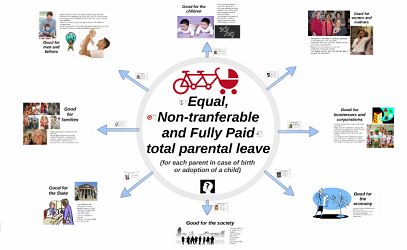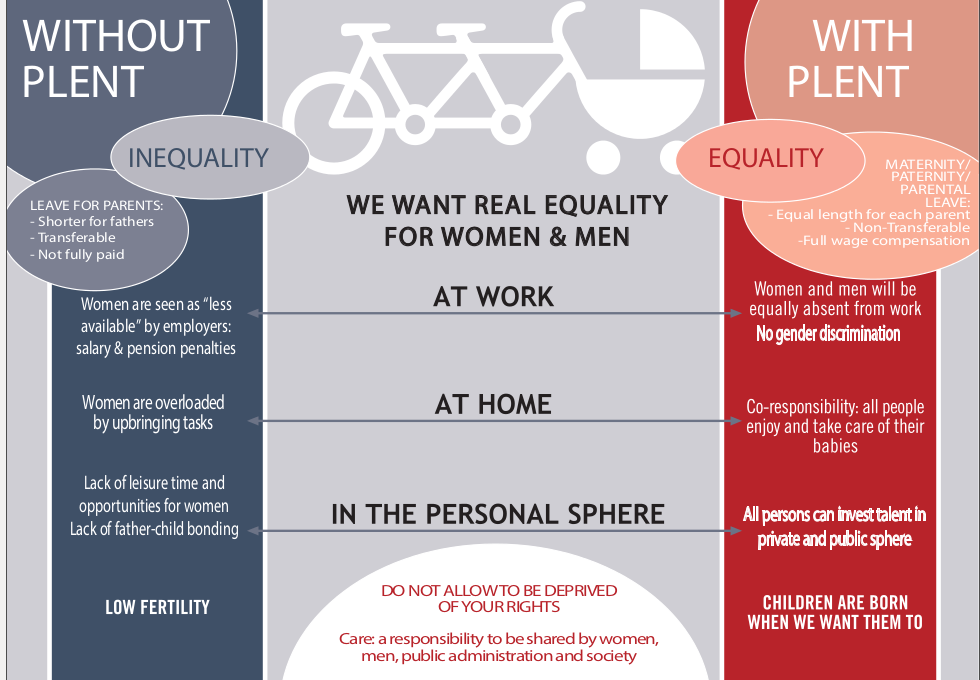 The European Commission has submitted the European Parliament a legal reform proposal to assumingly improve work life balance and better involvement of men in care work. The International Coalition for Parental Leave Equal, Non Transferable and 100% Paid (PLENT) claims this is another example of a political maneuver to consolidate inequality while pretending to achieve equality.
The European Commission has submitted the European Parliament a legal reform proposal to assumingly improve work life balance and better involvement of men in care work. The International Coalition for Parental Leave Equal, Non Transferable and 100% Paid (PLENT) claims this is another example of a political maneuver to consolidate inequality while pretending to achieve equality.
At present, there are two directives about parental leaves that are totally disconnected, even though they refer to the same reality and derived social problems:
- Maternity Directive establishing a 14-week leave (at a minimum) only for mothers that is paid up to 100% wage replacement.
- Parental Leave Directive establishing a minimum of 4-month unpaid leave for parents, either mothers or fathers, where one month must be non-transferable.
Generally speaking, men do not take up any of these two types of leaves, as research shows that they only take up those that are clearly targeted to them, are non-transferable and are paid at least over 80% of their current salary.
Now, the EC presents a proposal to reform the Parental Leave Directive without changing the Maternity Directive. The new proposal establishes a non-transferable 4-month parental leave for each parent that can be taken during the first 12 years of children’s lives. And, in addition, a new 10-day paternity leave to be taken as of the date of children’s birth. Both leaves are paid to the level of sick leave. Although this may be perceived as progress, it is in practice a very dangerous trap as it will increase the unbearable disparity in women’s and men’s uptake of parental leaves.
- Because the new parental leave will be now paid, a majority of mothers would extend their maternity leave for an additional period of four months, or even further, as they would be now allowed to take this parental leave in flexible forms, including part-time, and in combination with other flexible work arrangements, such as reduced working hours. Therefore, for instance, mothers in Spain (who already have a 4 month maternity leave) would most likely care full-time for the baby during the first 8 months of the baby’s life or even during the totality of the first year.
- But fathers won’t take the new parental leave in countries like Spain, where the proposed remuneration (sick leave is paid at 75% of the salary in the case of Spain) does not reach the 80% of the salary, the tipping point over which most fathers would take up non-transferable leave. In addition, the 4-month parental leave can be taken up in a piecemeal way for 12 years, until the child is 12 years old. Therefore, fathers in a majority of the EU countries would most likely take up just their short 2 week paternity leave as of the date of the baby’s birth, at the same time as the mother, and maybe some days of the new parental leave every year all along 12 years (thus with no period of taking full and sole responsibility for the baby’s care).
From the PLENT coalition, we denounce several pitfalls that the European Commission will manage to introduce in the fine print of this legal reform if it is passed as is, while taking advantage of the chaotic and disperse existing legislation. The effects of legislating this issue through two separate directives are well known and acknowledged by the European Commission but never challenged, showing a vested interest in keeping the status quo:
Pitfall of establishing parental leave remuneration at the level of sick leave: Why would these new parental leaves not be fully paid up to 100% wage replacement as maternity leaves generally do? Caring for babies is not a sickness. And neither is it when mothers take care of babies nor when fathers do.
Pitfall of extending the period for uptaking the new leave up to 12 years, until the child is 12 years old: This proposal enables fathers to take the 4-month leave in a piecemeal way, a day at a time if so decided, instead of enabling fathers to take full responsibility as mothers do during the first months of the child’s life.
Pitfall of enabling uptake of parental leave on a part-time basis as well as other flexible work arrangements such as reduced working hours at the same time: Why do they call it part-time when in practice most women would be tempted to take leave twice as long but paid at a half the salary rate?
Pitfall of confusing legal framework: Why two separate Directives that design leaves for the same social event, birth or adoption of a child? Why one of them establishes equal leaves for men and women while at the same time forgets to mention that they are a continuation of the already unequal maternity (14 weeks) and paternity (2 weeks) leaves? Why to give them different names, different conditions to take them up, remuneration scales, and other complicated mechanisms that make it difficult for people to understand and elusive for the objective of gender equality?
All these pitfalls have the same result: while women will keep taking care of babies as before, men will be kept away from providing the same type of care during the first months of the child’s life, as before.
The PLENT coalition alerts: if this legal reform proposal made by the European Commission gets approved, it would cause a serious step backwards. As it goes in the opposite direction, it would make enormously difficult to progress towards leaves that are equal, non-transferable and paid at 100% wage replacement in all European Union Member States. Women would pay a price in terms of employment while men would continue to be unable to take care of their children on an equal footing. And, worse, this legal reform would be very difficult to reverse.
The European Commission acknowledges that as of the year 2000, a balanced leave uptake from men and women is an essential condition for equality in employment and in care work. It also acknowledges that men only take up leaves under the conditions that they are non-transferable and paid over 80% of their salary. However, when it comes to draft a new directive, the EC forgets these evidences and their own statements about gender equality.
Any of these options is unacceptable: Whether the European Commission is either naïve in their understanding of gender inequality dynamics or whether they are deliberately aiming at hampering gender equality.
The International Coalition for Parental Leave Equal, Non-Transferable and 100% Paid (PLENT) has been demanding the integration and replacement of these two directives into a single one for more than 7 years. This unique Directive would establish equal leaves, non-transferable and paid at 100% wage replacement for each parent.
No more cheating gender equality, lets demand substantive equality NOW!







Pingback: From the EC Directive on Work-Life Balance to Real Equality. The proposal of PLENT – PLENT
Pingback: PLENT statement on the proposal of European Directive on work-life balance – PLENT